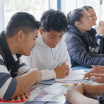Learner variability
An introduction to UDL and its value in an Aotearoa New Zealand context.
On this page:
On this page:
Current page section: Learner variability
Go to top of current page: Learner variability
Go to top of current page: Learner variability
Go to top of current page: Learner variability
What is learner variability?
What is learner variability?
The differences learners bring influence how they learn.
Every learner brings unique and varied experiences, strengths, skills, knowledge and intersecting identities to learning.
They also bring differences in:
- how they are motivated and engage in learning
- how they perceive, access and make sense of information
- how they use tools, take action, express ideas and demonstrate understanding.
Planning with this variability in mind at the outset is central to UDL.
Source: Expression and communication: UDL Guidelines 3.0 | CAST (2024) (opens in a new tab/window)
Why variability matters
Why variability matters
Dr Todd Rose, Harvard University, talks about why planning for variability is critical.
Closed Captions
Variability and the learning brain
Variability and the learning brain
UDL helps us support the brain networks that influence learning and plan for variability.
Planning for predictable variability
Planning for predictable variability
UDL helps us consider variability across four dimensions.
It helps us think about the "why", "how", "what" and "who" of learning (CAST, 2024).
UDL has traditionally emphasised the variability among learners in:
- engagement – the "why" of learning (how they engage with learning)
- representation – the "what" of learning (how they perceive information)
- action and expression – the "how" of learning (how they act on and express what they know).
UDL Guidelines 3.0 expands this view to include: Identity – the "who" of learning:
- Recognising that learners bring multiple, intersecting identities (for example, cultural, linguistic, racial, gender-based).
- Acknowledging that identities shape how learners engage with, perceive, and express their learning.
Note: Identity is not a separate category but is interwoven across all three UDL principles.
Source: About the Guidelines 3.0 update: UDL Guidelines 3.0 | CAST (2024) (opens in a new tab/window)
Useful resources
Useful resources

UDL and the Learning Brain
Read time: 5 min
A rationale for UDL based on findings from neuroscience.
Publisher: CAST (2024)

Research@Work: Embracing Learner Variability in Schools
Read time: 2 min
In this video, David Rose discusses the importance of providing learning supports and structures that are tailored to students’ individual needs and abilities. He shares his vision for “de-standardizing” education to help students discover their strengths and become expert learners.
Publisher: Digital Promise
Next steps
More suggestions for implementing the strategy “Find out about UDL”:
-
Current page Learner variability
Return to the guide “Universal Design for Learning”

How to use this site
Guide to Index of the guide: Universal Design for Learning
Understand:
- Why UDL is valuable
-
Find out about UDLShow suggestions for Find out about UDL
- Learner variability
- Learner agency
- UDL framework and guidelines
- UDL and differentiation
- Myths and facts about UDL
Strategies for action:
-
Design multiple means of EngagementShow suggestions for Design multiple means of Engagement
-
Design multiple means of RepresentationShow suggestions for Design multiple means of Representation
-
Design multiple means of Action and ExpressionShow suggestions for Design multiple means of Action and Expression
-
How to plan using UDLShow suggestions for How to plan using UDL
-
Design considerations in primary settingsShow suggestions for Design considerations in primary settings
-
Design considerations in secondary settingsShow suggestions for Design considerations in secondary settings
-
Design considerations in NCEA assessmentsShow suggestions for Design considerations in NCEA assessments
![11402 [udlandthebrain-cast-noborder.jpg]](https://inclusive-live-storagestack-assetstorages3bucket-3uty0hejzw6u.s3.ap-southeast-2.amazonaws.com/public/inclusive-education/example-images/udlandthebrain-cast-noborder__ScaleMaxWidthWzEwODZd.jpg)
